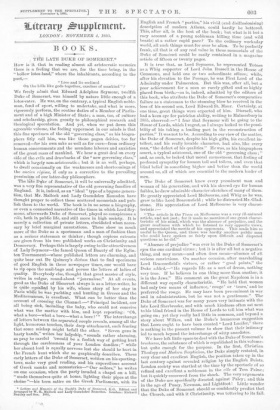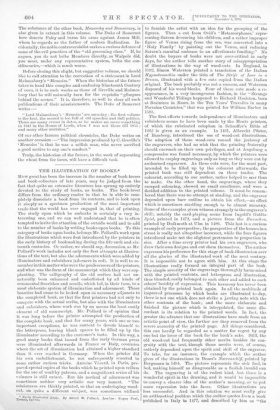BOOKS.
I it T LATE DUKE OF SOMERSET.* How is it that in reading almost all aristocratic memoirs there is a feeling that we are, for the time being, in the " hollow lotos-land," where the inhabitants, according to the poet,— "Live and lie reclined
On the hills like gods together, careless of mankind" P
We freely admit that Edward Adolphus Seymour, twelfth Duke of Somerset, was himself by nature little enough of a lotos-eater. He was, on the contrary, a typical English noble- man, fond of sport, willing to undertake, and what is more, rigorously perform, the routine duties of a Member of Parlia- ment and of a high Minister of State ; a man, too, of culture and scholarship, given greatly to philosophical research and theological speculation. And yet, when we put down this agreeable volume, the feeling uppermost in our minds is that this fine specimen of the old "governing class," as his biogra- phers fitly call him, was like those pagan deities, too far removed—for his own sake as well as for ours—from ordinary human concernments and the mundane labours and anxieties of the great mass of mankind. We hear a great deal on every side of the evils and drawbacks of the "new governing class," which is largely non-aristocratic ; but it is as well, perhaps, to dwell occasionally on the weaknesses and shortcomings of the ancicn regime, if only as a corrective to the prevailing pessimit6 of our latter-day philosophers. The ate Dike of Somerset, it will be universally admitted, was a very fine representative of the old governing families of England. It is, indeed, asan" ideal " type of a bygone genera- tion, that Mr. Mallock and Lady Guendolen Ramsdell have thought proper to collect these scattered memorials and pub- lish them to the world. The book is in no sense a biography, or even a connected narrative of the times in which Lord Sey- mour, afterwards Duke of Somerset, played so conspicuous a rile, both in public life, and still. more in high society. It is merely a collection of private letters, elucidated when neces- sary by brief marginal annotations. These show us much more of the Duke as a sportsman and a man of fashion than as a serious statesman or thinker ; though copious extracts are given from his two published works on Christianity and Democracy. Perhaps this is largely owing to the attractiveness of Lady Seymour—the famed Queen of Beauty of the Eglin- ton Tournament—whose published letters are charming, and quite bear out De Quincey's dictum that to find specimens of good English in these newspaper times, one would have to rip open the mail-bags and peruse the 'letters of ladies of quality. Everybody else, thought that great master of style, writes in vulgar, round-about "journalese." At all events, good as the Duke of Stonerset always is as a letter-writer, he is quite equal* by his wife, whose story of her stay in Paris while be Was yachting and hunting in Greece and the Mediterranean, is excellent. What can be better than the account of crossing the Channel :—" Principal incident, our all being sick, including the baby, who could not conceive what was the matter with him, and kept repeating : Oh, what a bore—what a bore—what a bore !'" The interchange of letters between the separated couple reveals, among all the light, humorous touches, their deep attachment, each fearing that some mishap might befall the other. " Seven guns in hasty hands," writes her ladyship, "sounds rather alarming, so pray be careful 'twould be a foolish way of getting hurt through the carelessness of your London dandies ; " while her absent lord is equally nervous lest she should be hurt in the French hunt which she so graphically describes. These early letters of the Duke of Somerset, written on his sporting- tour, make very good reading, and his supercilious account of Greek monks and monasteries—" Our sailors," he writes on one occasion, when the party invaded a chapel on a hill, "made themselves quite at home, lighting their pipes at the shrine "—his keen satire on the Greek Parliament, with its * Letters and Memoirs of tho Twelfth Duke of Somerset, LG. Edltod and Arranged by W. II, Mallock and Lady Guendelon Ramsdell. London: Richard Bentley and Son. 1833. English and French "parties," his vivid (and disillusionising) description of modern Athens, could hardly be bettered. This, after all, is the best of the book ; but what is it but a racy account of a young nobleman killing time (and wild beasts) at a rather rapid pace ? To the ordinary workaday world, all such things must for ever be alien. To be perfectly frank, all that is of any real value in these memorials of the Duke of Som&set could be easily contained in a magazine article of fifteen or twenty pages.
It is true that, as Lord Seymour, he represented Totnes as a Whig supporter of Lord John Russell in the House of Commons, and held one or two subordinate offices; while, after his elevation to the Peerage, he was First Lord of the Admiralty under Palmerston. But this was, after all, but a poor achievement for a man so rarely gifted and so highly placed from birth,—as is, indeed, admitted by the editors of this book, who attribute the Duke of Somerset's comparative failure as a statesman to the stunning blow he received in the loss of his second son, Lord Edward St. Maur. Certainly, at one time, great things were expected of him. Disraeli, who had a keen eye for patrician ability, writing to Malmesbury in 1855, observed :—" I fear that Seymour will be going to the House of Lords, which I regret, as I always looked to the possi- bility of his taking a leading part in the reconstruction of parties." It was not to be. According to our view of the matter, the Duke of Somerset, despite his high gifts, his excellent in- tellect, and his really lovable character, had also, like every man, " the defect of his qualities." He was, as his biographers assert, a typical aristocrat, one of the old " governing class ; " and, as such, he lacked that moral earnestness, that feeling of profound sympathy for human toil and toilers, and even that blind belief in something higher and bettor than the world around us, all of which are essential to the modern leader of men.
The Duke of Somerset knew every prominent man and woman of his generation, and with his shrewd eye for human foibles, he drew admirable character-sketches of many of them. He greatly appreciated Lord Melbourne, and Whig as he was, grew to like Lord Beaconsfield ; while he distrusted Mr. Glad- stone. His appreciation of Lord Melbourne is very charac- teristic :— " Tho article in the Times on Melbourne was a very ill-natured article, and not just ; for it made no mention of one great charac- teristic of his mind, which was the absence of prejudice, and the groat readiness with which he listened to very opposite views, and appreciated the merits of his opponents. This made him so useful to the Queen, and there was hardly another public man who could have spoken so fairly upon difficult and disputed questions as ho did."
"Absence of prejudice " was ever in the Duke of Somerset's eyes the one cardinal virtue ; but it is after all but a negative thing, and may mean—and often does mean—absence of alt serious convictions. On another occasion, after marshalling Lord Beaconsfield's virtues, or rather " good points," the Duke added,—" He regards life as a sort of dream, nothing very true. If he believes in one thing more than another, it is in the Jews." His comment on the great Napoleon is in a different way equally characteristic. "He held that women had only two means of influence, rouge' or tears,' and he preferred the rouge. He may have been pre-eminent in war and in administration, but he was not a gentleman." The Duke of Somerset was for many years very intimate with the late Lord Sherbrooke, and with much kindness often sat next to his blind friend in the House of Lords to tell him what was going on ; yet they really had little in common, and beyond a story about Wilkes, and the Dake's humorous suggestion that Lowe ought to have been created " Lord Lucifer," there is nothing in the present volume to show that their intimacy led to much beyond the interchange of witty anecdotes. We have left little space to deal with the Duke of Somerset's brochures, the substance of which is republished in this volume: but quite enough for the purpose. In the first, Christian Theology and Modern Scepticism, the Duke simply restated, in very clear and excellent English, the position taken up in the last century against revealed religion by the English Deists. London society was startled at the time by the spectacle of so refined and excellent a nobleman in the role of Tom Paine ; but it quickly recovered from the shock. The very arguments of the Duke are specifically directed against Paley ; and this in the age of Pusey, Newman, and Lightfoot I Little wonder that the Duke of Somerset should so confidently predict that the Church, and with it Christianity, was tottering to its fall. The substance of the other book, Monarchy and Democracy, is also given in extract in this volume. The Duke of Somerset here deserts Paley and turns his arms against James Mill, whom he regards as the father of modern Radicalism. In- cidentally, the noble controversialist makes a curious defence of some of the evil practices of the "old governing class." If, he argues, you do not bribe Members directly, as Walpole did, you must, under any representative system, bribe the con- stituencies,—which is much worse.
Before closing this slight, but suggestive volume, we should like to call attention to the correction of a statement in Lord lelalmesbury's "Memoirs." When the historian of the future takes in hand this complex and confusing Nineteenth Century of ours, it is to such works as those of Greville and Malmes- bury that he will naturally turn for the requisite "glimpses behind the scenes!' It is, therefore, as well to clear all such publications of their misstatements. The Duke of Somerset writes :- " Lord Malmesbury's ' Memoirs' are amusing ; the first volume is the best, the second is too full of old speeches and dull politics. There are many errors in dates, as he makes me move something in ]841 in the House of Lords, when I was not there till 1855 ; and many other mistakes."
Of our other famous political chronicler, the Duke writes on another occasion :—" The impression produced by C. Greville's Memoirs' is that he was a selfish man, who never ascribed a good motive to any one's conduct."
Truly, the historian of the future, in the work of separating the wheat from the tares, will have a difficult task.





















































 Previous page
Previous page